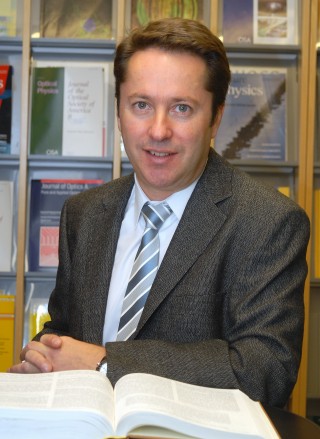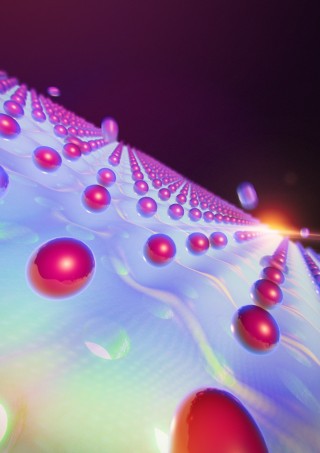This year’s “Hamburg Prize for Theoretical Physics“ will be given to Prof. Dr. Ignacio Cirac, Director of the Department Theory at the Max Planck Institute of Quantum Optics in Garching. Cirac will be awarded for his outstanding works in three highly topical research fields: quantum information theory, quantum optics and the physics of many body systems.

Prof. Dr. Ignacio Cirac. Credit: Thorsten Näser
His quantum physics models are particularly pioneering for the control and storage of information, which are, for instance, important for the development of quantum computers. “The award involves research and teaching stays of Prof. Cirac in Hamburg. The prize not only strengthens Hamburg as a research location, it moreover fosters the exchange with young scientists”, says Petra Herz, Chairperson of the Joachim Herz Stiftung.
Cirac develops methods to describe and control atoms, molecules and photons on the basis of quantum mechanics.

Illustration of a lattice that can be used to capture atoms and stimulate mutual reactions. © Alejandro González-Tudela und Paco Martinez Tomas (Max Planck Institut für Quantenoptik, Abteilung Theorie)
Some of his pioneering works demonstrate how quantum physical properties can be used to transfer and store information in a secure way. This is a prerequisite for the development of quantum computers with which operations and calculations can be carried out much faster than with conventional computers. Quantum computers could much simplify database searches and revolutionize the security of data communication. Cirac’s methods not only advance the field of quantum computing, they also make major contributions to other fields like solid state physics, superconductivity and recently even the simulation of models of particle physics. “This is also a reason why his visits to Hamburg are of great importance. He develops methods and tools which can be applied to many areas”, says Prof. Schmelcher from the Centre for Optical Quantum Technologies in Hamburg.
Award connects research and education
“We very much look forward to Prof. Cirac’s visits. Besides his works on quantum information theory, his methods can be applied to quantum many body problems with ultracold atoms and lead to a deeper understanding of macroscopic properties such as magnetism or the emergence of superconductivity. And there will be many starting points for joint research projects in Hamburg”, says Prof. Sengstock, chairperson of the Jury and spokesperson of the Hamburg Centre for Ultrafast Imaging (CUI).
The award was originally established in 2010 by the state cluster of excellence “Frontiers in Quantum Photon Science” at Universität Hamburg, which was supported by the Joachim Herz Stiftung. Since 2013 the prize has been awarded jointly by the federal cluster of excellence CUI and the Joachim Herz Stiftung. During this year’s international CUI Symposium in Hamburg-Bahrenfeld the prize, that comes with a personal prize money of 40,000 euro, will be awarded to Prof. Cirac on 12 November 2015.
More:
The laws of the quantum world
From the point of view of our every-day life’s macroscopic world, the world of quanta is governed by counter-intuitive and apparently implausible rules. In particular, superpositions of states are possible. Researchers use this property in the field of quantum information theory. In a conventional computer information is encoded with bits that can take on the values 0 and 1. In a quantum computer, however, a superposition of the two states 0 and 1 is possible. The so-called “quantum-bit” contains these two values at the same time and only upon a measurement the system takes on one of the two values.
Due to this special feature quantum mechanics opens up completely new possibilities to store data and carry out operations. In certain areas of data processing, in particular for the encryption of information, quantum computers can provide much more computing power and much securer methods than conventional computers. However, up to now a complete transfer of theoretical insight on quantum computers into practical applications has not been achieved.
At the same time the laws of quantum physics lead to many complications. For instance, quantum superpositions are much more sensitive to external interactions. Ignacio Cirac has proposed new methods to better protect sensitive quantum information from external influences.

